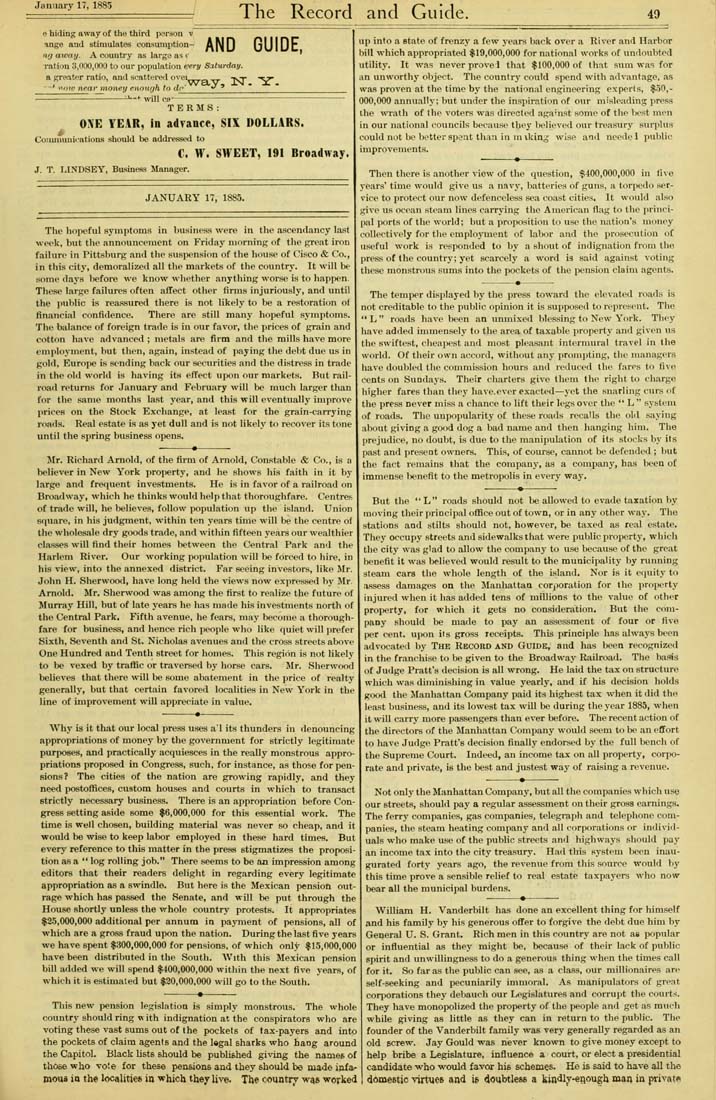Columbia University Libraries Digital Collections: The Real Estate Record
Use your browser's Print function to print these pages.
The Record and guide: [v. 35, no. 879]: January 17, 1885

Text version:
Please note: this text may be incomplete. For more information about this OCR, view About OCR text.
January 17, 188.5 -I The Record and Guide. 49 AND GUIDE, e hiding away of the third person v ange and stimulates eonsuraption- 11(7 away. A country as large as < T.atioii 3,000,n00 to our population very S.tlurday. a gre.-itor ratio, aud scattered ovei -j,^ -^rr '>oK' near money enough to do' TERMS: OXE YE.IR, in advance, SIX DOLLARS. Coiiiniunications should be addre.ssed to C. W. SWEET, 191 Broadway. J. T. LINDSEY, Business Manager. JANUARY 17, 1885. Tho liopefiil symptoms in business were in the .ascendancy last week, but the announcement on Friday morning of the great iron failure in Pittsburg and tlie suspension of the house of Cisco & Co., in this citj-, demoralized all the markets of the country. It will be some daj's before we know whether anything worse is to happen. These large failures often affect other firms injuriously, and until the Jiublic is reassured there is not likeh' to be a restoration of financial confidence. There are still many hopeful symptoms. Tbe balance of foreign trade is in our favor, the prices of grain and cotton have advanced ; metals are firm and the mills have more employment, hut then, again, instead of p.aying the debt dvie us in gold, EurojK? is sending back our securities and tbe distress in trade in the old world is having its effect upon our markets. But rail¬ road returns for January and February will be mucli larger than for the same months last J'ear, and this will eventually improve prices on the Stock Exchange, at least for the grain-carrying roads. Real estate is as yet dull and is not likely to recover its tone until the spring business opens. Mr. Richard Arnold, of the firm of Arnold, Constable & Co., is a believer in New York property, and he shows his faith in it by large and frequent investments. He is in favor of a railro.ad on Broadway, which he thinks would help that thoroughfare. Centres of trade will, he telieves, follow population up tlie island. Union square, in his judgment, within ten j-ears time will be the centre of the wholesale dry goods trade, and within fifteen j-ears our wealthier cla.sses will find their homes between the Central Park and the Harlem River. Our working population will be forced to hire, in his view, into the annexed district. Far seeing investors, like Mr. John H. Sherwood, have long held the views now expressed bj- Mr. Arnold. Mr. Sherwood was among the first to realize the future of Murray Hill, but of late j'ears he has made his investments north of the Central Park, Fifth avenue, he fears, may become a thorough¬ fare for business, and hence rich people who like quiet will prefer Sixth, Seventh and St. Nicholas avenues and the cross streets above One Hundred and Tenth street for homes. This region is not likely to be vexed by traffic or traversed bj- horse cars. Mr. Sherwood believes that there will be some ab.atement in the i)rice of realty generallj', but that certain favored localities in New York in the line of improvement will appreciate in value. up into a state of frenzj' a few years back over a River and Harbor bill which appropriated |19,000,000 for national works of undoubted utility. It was never provel that $100,000 of that sum was for an unworthy object. The country could spend with advantage, as w.as proven at the time by the national engineering experts, $.iO,- 000,000 annu.ally; hut under the inspiration of our misleading press the wrath of the voteris was directed against some of the best men in our national councils because they believed our treastiry surplus could not be better spent than in m iking wise and needel iniblic improvements. --------•-------- Then there is another view of the question, $400,000,000 in five years' time would give us